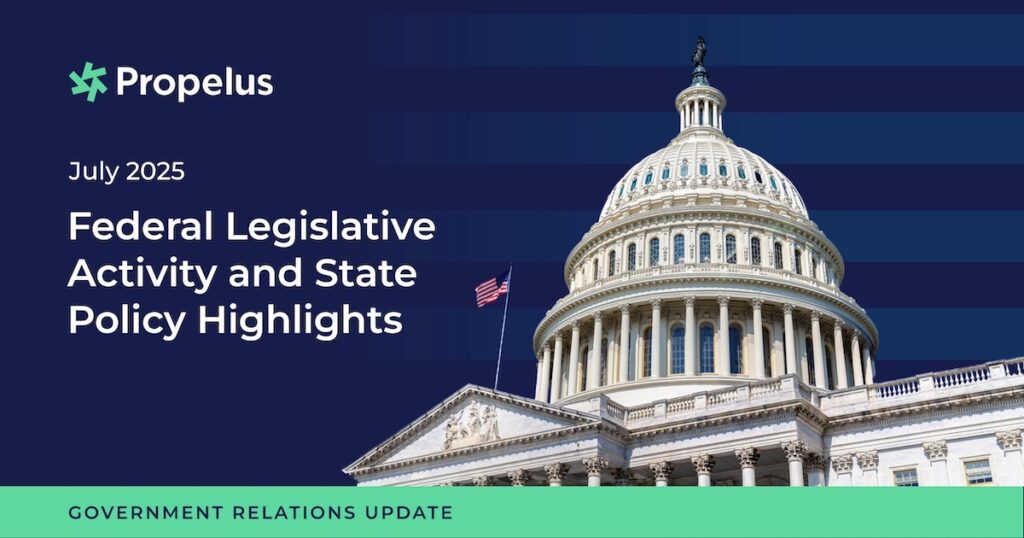July Government Relations Update: Federal Legislative Activity and State Policy Highlights

By Kelly Parker, Vice President of External Affairs and Government Relations, Propelus Welcome to the July 2025 edition of our monthly Government Relations Update, your go-to source for navigating the evolving landscape of nationwide legislative and policy initiatives. This month, we cover significant federal activities, including H.R. 1 and the establishment of the Rural Health Transformation Fund, the reintroduction of the Resident Physician Shortage Reduction Act, proposed telehealth flexibilities under the Medicare Physician Fee Schedule, and the Department of Justice’s (DOJ’s) historic healthcare fraud crackdown. We also highlight key state policy developments, from continuing education modernization in New Jersey to expanded licensure pathways for internationally-trained physicians in Texas and Rhode Island, along with important updates on interstate compacts. Here’s a rundown of the key updates. Federal Activity Our federal legislative update begins with a look at the One, Big, Beautiful Bill, H.R. 1 and its implications for rural healthcare. The “Rural Health Transformation Fund” under H.R. 1 On July 4, 2025, President Donald Trump signed into law H.R. 1, known as the One, Big, Beautiful Bill Act. While the legislation has raised concerns over reductions to Medicaid—particularly in rural areas—it also establishes a major new initiative aimed at supporting rural healthcare infrastructure: the Rural Health Transformation Fund. Key Details: Total Fund: $50 billion Annual Allocation: $10 billion per year (2026–2030) Administered by: Centers for Medicare & Medicaid Services (CMS) Eligibility: States with CMS-approved Rural Health Transformation Plans Application Deadline: December 31, 2025 Rural Health Transformation Plan Requirements To qualify for funding, each state must submit a comprehensive Rural Health Transformation Plan to CMS. The plan must detail how the state will: Improve access to hospitals and healthcare providers for rural populations Enhance health outcomes for rural residents Prioritize innovation by leveraging emerging technologies, including artificial intelligence (AI), with a focus on prevention and chronic disease management Establish strategic partnerships between rural hospitals and other providers to drive measurable quality improvements, strengthen financial sustainability, achieve economies of scale, and facilitate best practice sharing Expand the rural healthcare workforce through recruitment and training initiatives Utilize data-driven and technology-enabled solutions to deliver high-quality care close to home Ensure long-term solvency of rural hospitals Analyze and address root causes of rural hospital closures or conversions CMS is required to approve or deny all applications by December 31, 2025. Each state may submit only one application, covering the entire five-year funding period. Moving from the Rural Health Transformation Plan, we turn our attention to efforts aimed at addressing physician shortages, reimbursement for telehealth, and enforcement actions by the DOJ. Resident Physician Shortage Reduction Act (H.R. 3890) Congress has reintroduced the Resident Physician Shortage Reduction Act, sponsored by Representatives Terri Sewell (D-Ala.) and Brian Fitzpatrick (R-Pa.). The bill aims to create 14,000 new Medicare Graduate Medical Education (GME) positions over seven years, adding 2,000 residency slots annually from 2026 through 2032. It also includes provisions to formally establish the Rural Residency Planning and Development Program. Telehealth & Medicare Physician Fee Schedule The Centers for Medicare & Medicaid Services (CMS) has released the proposed 2026 Medicare Physician Fee Schedule (MPFS), introducing several key provisions that signal meaningful progress for the telehealth community. A notable highlight is the extension of telehealth flexibilities through 2029. Originally scheduled to expire at the end of 2025, these COVID-era provisions—if adopted—could be extended for an additional four years. DOJ Launches Historic 2025 Healthcare Fraud Crackdown On June 30, 2025, the Department of Justice (DOJ) initiated the largest healthcare fraud enforcement action in U.S. history. A total of 324 defendants—including 96 licensed healthcare professionals—were charged across 50 federal districts for their alleged involvement in schemes exceeding $14.6 billion in intended losses. The charges encompass a wide range of fraudulent activities involving telemedicine, genetic testing, durable medical equipment (DME), opioids, hospice care, wound treatment, and more. State Policy Highlights Shifting our focus from federal actions, we now explore key policy developments at the state level. Continuing Education Modernization – New Jersey (S4387) Before the summer recess, the New Jersey Senate unanimously passed Bill S4387, which requires the Division of Consumer Affairs to develop and implement a modernized technology system for continuing education across all licensed professions. The Assembly is expected to consider the bill when the legislature reconvenes. Interstate Compacts – IMLCC On July 1, 2025, North Carolina Governor Josh Stein signed House Bill 67 (Session Law 2025-37) into law, officially making North Carolina the 44th member jurisdiction of the Interstate Medical Licensure Compact (IMLCC). On July 7, 2025, Pennsylvania began issuing its first compact privileges under three health care licensure compacts: the Interstate Medical Licensure Compact, the Physical Therapy Compact, and the Nurse Licensure Compact. AI & Regulatory Rule Review On July 11, 2025, Virginia Governor Glenn Youngkin signed Executive Order 51, launching a first-in-the-nation pilot program that uses agentic AI—a form of artificial intelligence capable of autonomous, multi-step decision-making—to review statewide regulations and guidance documents. This initiative builds on Virginia’s prior success in regulatory reform, where the state exceeded its 25% reduction goal by cutting 26.8% of regulatory requirements and significantly reducing the length and complexity of guidance documents. The new AI-driven effort is designed to help agencies meet or exceed those benchmarks. Physician Licensure: Expanded Pathways for Internationally-Trained Physicians Texas and Rhode Island have recently passed new laws that broaden licensure options for internationally-trained physicians (ITPs) to address physician shortages. These states join 14 others that have introduced similar legislation since 2023. While the exact criteria vary by state, they generally allow qualified ITPs to obtain full medical licensure following a provisional licensure period, without requiring completion of an accredited residency program in the U.S. or Canada. Telehealth- North Carolina Enacted on July 7, North Carolina HB 546 authorizes health care professionals who provide telehealth-only services to participate in the state’s Medicaid program without being physically present in North Carolina. Pending Legislation of Interest – Michigan SB 428 Michigan SB 428 proposes licensure for anesthesiologist assistants (AAs)
